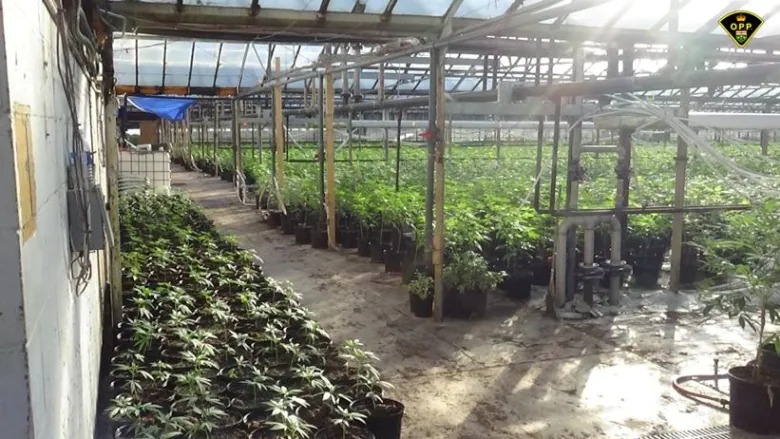You are here
Home 🌿 Marijuana Politics 🌿 Farm workers in cannabis grow-op raids often oblivious to criminal nature, OPP say 🌿Farm workers in cannabis grow-op raids often oblivious to criminal nature, OPP say

Southwestern Ontario has highest concentration of illegally grown pot, police say
Illegal marijuana grow operations most often crop up on the Ontario Provincial Police's radar in Essex County, and during raids, farm workers are "almost every time" completely unaware of the criminals behind the cannabis, police told CBC News.
Organized crime entities use illegal cannabis grow operations as "easy, quick" cash that's "relatively risk free," according to Det.-Insp. Peter Donnelly, hub commander of the central region's organized crime enforcement branch. That money is then used to traffic harder, illicit drugs such as cocaine, methamphetamines and fentanyl, he added.
"Just the amount of money it gives them access to, that makes it scary," said Donnelly.
Part of his role is to manage the provincial joint forces cannabis enforcement team, which works with local police services. Donnelly said his team specifically focuses on "organized crime and their tentacles that reach into the cannabis market."
It's a mixture of local farm workers and migrant workers who get tangled up in what they believe is a legitimate cannabis operation.
The deception starts when the workers are shown documents stating cannabis is legal in Canada, and sometimes they see a legitimate licence, Donnelly said.
"But what people don't know is these people are far exceeding the scope of their licence, and they have multiple, multiple sites," said Donnelly, who's seen situations where one group may have 40 different illegal cannabis grow locations.
"They're [workers] drawn in to what they believe is a legitimate business. Normally they don't have any idea what they're doing is criminal."

Sometimes the conditions are harsh and difficult, Donnelly said, and in most cases, the workers are "super co-operative" because they were completely oblivious.
"So they're happy to tell the police who they work for, and what exactly they've been doing and how long they've been doing it."
Migrant workers reach out for help
In November, Santiago Escobar, national representative for the United Food and Commercial Workers Union Canada, said he had received calls from migrant workers in such situations.
He said some left what they described as an abusive employer, sought other jobs through a temp agency and were placed in an illegal operation they were told was legitimate.
"These workers told us that they were misled," said Escobar.
"These workers are voiceless, abandoned, experiencing many barriers, and due to their precarious status and lack of representation, they are easy targets for these kind of unscrupulous employers and criminals."
He said it can be complicated and overwhelming for migrant workers to be charged criminally in something they thought was legal, and then needing the financial resources for legal representation.
In most raids, the OPP said, workers unknowingly participating in an illegal cannabis grow operation aren't charged.
If the person is a migrant worker, the Immigration, Refugees and Citizenship Canada (IRCC) told CBC News, they "will not be criminally inadmissible" in the future as long as there aren't any charges or convictions.
Even those who are charged or convicted can go through a process known as the Authorization to Return to Canada. It allows them to "demonstrate that there are compelling reasons to come to Canada," an IRCC spokesperson, Julie Lafortune, said in an email.

The Canada Border Services Agency (CBSA), which is responsible for admissibility screening and removals, said if a temporary foreign worker loses their job through no fault of their own, that does not automatically bar them from entering Canada and they won't automatically be sent home.
In some cases, the CBSA said, a migrant worker may qualify for employment insurance. There are also government supports to help them find a new job or placement in Canada.
If the migrant worker wishes to return home, that's generally at the expense of the employer who brought them here.
Employment and Social Development Canada told CBC it does not tolerate any abuse or misuse of migrant workers through the Temporary Foreign Worker Program. The federal agency points to a vetting process to determine if an employment offer made to each migrant worker is genuine and legal.
Cannabis cash used to traffic other drugs
The OPP says organized crime groups are using these workers to funnel funds from illegally grown cannabis into other areas of Ontario or Canada.
Recently, Donnelly said, his team raided an operation that was supplying cannabis to illegal storefronts. They seized $6 million in pot and $400,000 in cash.
"They only care about the easiest way to make the most amount money possible," said Donnelly.
"They grow cannabis to get the money, to buy the cocaine, to buy the methamphetamine, and then they traffic them in the communities that you and I live in."
420 Intel is Your Source for Marijuana News
420 Intel Canada is your leading news source for the Canadian cannabis industry. Get the latest updates on Canadian cannabis stocks and developments on how Canada continues to be a major player in the worldwide recreational and medical cannabis industry.
420 Intel Canada is the Canadian Industry news outlet that will keep you updated on how these Canadian developments in recreational and medical marijuana will impact the country and the world. Our commitment is to bring you the most important cannabis news stories from across Canada every day of the week.
Marijuana industry news is a constant endeavor with new developments each day. For marijuana news across the True North, 420 Intel Canada promises to bring you quality, Canadian, cannabis industry news.
You can get 420 Intel news delivered directly to your inbox by signing up for our daily marijuana news, ensuring you’re always kept up to date on the ever-changing cannabis industry. To stay even better informed about marijuana legalization news follow us on Twitter, Facebook and LinkedIn.




